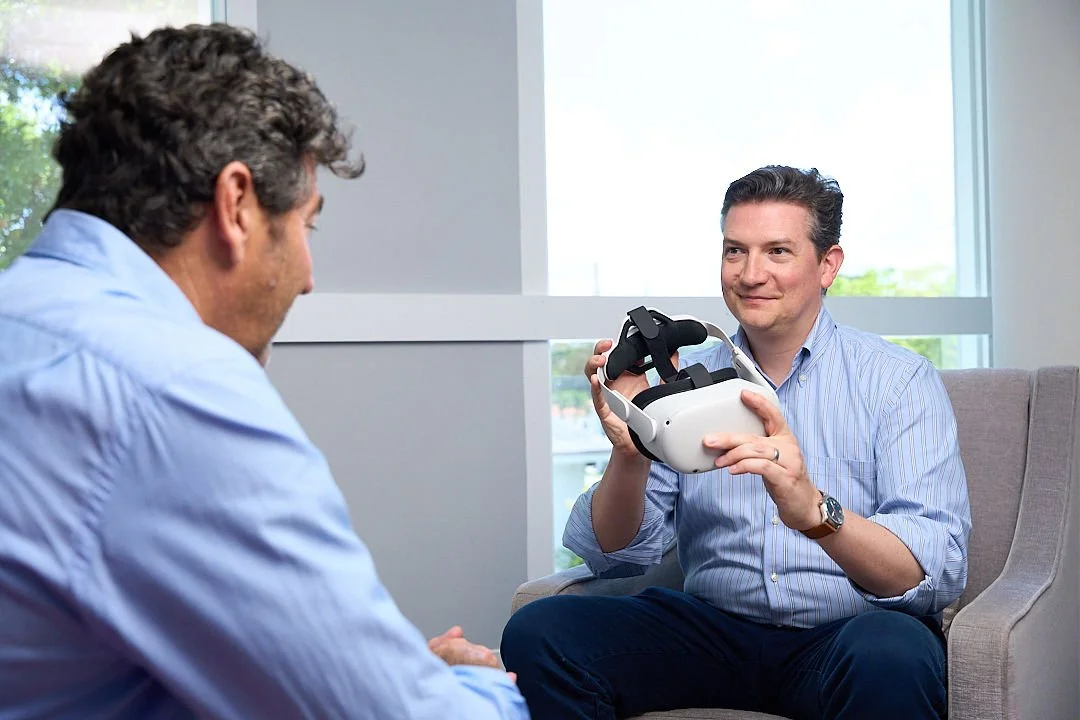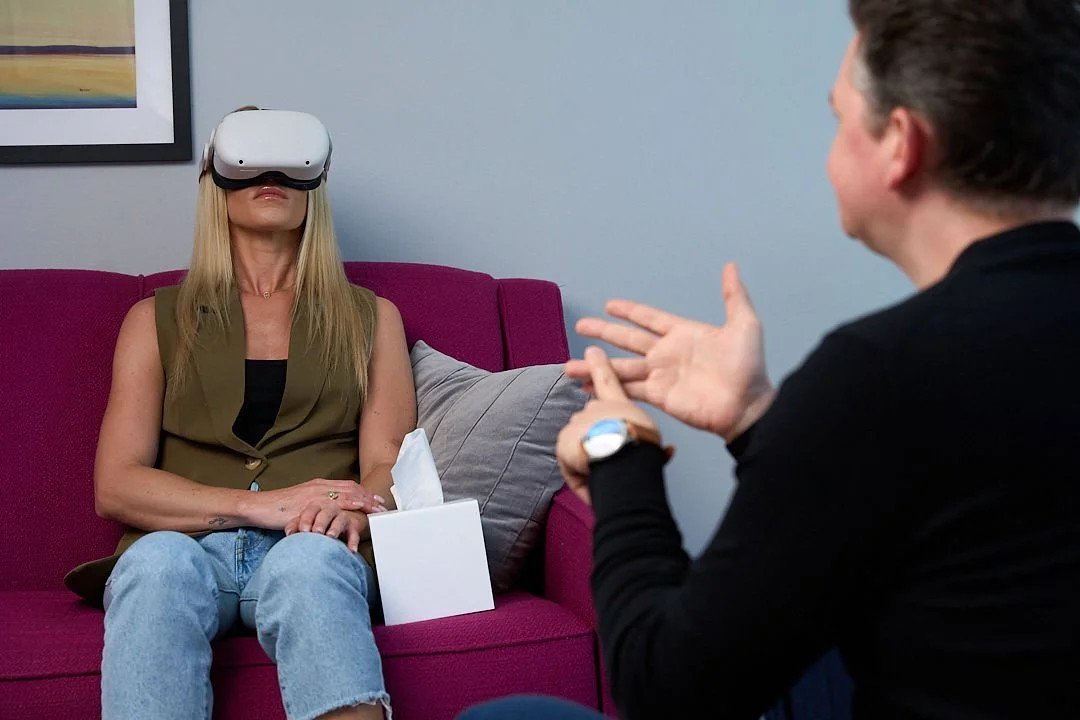
Virtual Reality Assisted Cognitive Behavioral Therapy
Our therapists are proud to provide cutting edge, virtual reality therapy for the treatment of anxiety and stress-related disorders.
Virtual Reality Therapy helps enhance already well-established therapeutic techniques like Cognitive Behavioral Therapy (CBT) and Exposure Therapy in the the treatment of social anxiety, specific phobias, and PTSD.
What is Virtual Reality (VR) Therapy?
VR technology is a tool used in place of real-life exposures. VR Therapy consists of a computer-generated virtual environment (VE) that elicits the sense of anxiety that a person would experience during real-world exposures.
By stimulating the user’s senses, VR therapy offers a realistic immersive experience that is especially valuable when the intricacies of real-world therapeutic exposure become too challenging due to time constraints and safety precautions.

How Virtual Reality Therapy Can Help
Exposure Therapy (ET)
Individuals can confront things that trigger their fears in a controlled virtual environment with the guidance of a therapist. Learn how to respond differently to fear-inducing situations rather than reinforcing existing fears and worries.
Cognitive Restructuring (CR)
People can use virtual scenarios to challenge unhelpful thought patterns. By practicing in this way, you can develop more balanced and adaptive ways of thinking, which can have a positive impact on your overall mental well-being.
Coping Skills Training
VR scenarios are used to teach individuals new coping skills and techniques to manage anxiety, fear, phobias, and symptoms of post-traumatic stress disorder (PTSD).
Generalization of Skills
The skills learned within the virtual environment can carry over into real-life situations. This means that improving in one fear-inducing situation can also reduce distress in other similar situations, helping you build distress tolerance skills.

Evidence is Strong for Virtual Reality Therapy
Over the last two decades, virtual reality (VR) has become a viable method for administering exposure therapy for anxiety disorders & specific phobias, and for the treatment of posttraumatic stress disorder (PTSD).
Virtual Reality Therapy can help with various types of issues, including but not limited to:
PTSD
- violence
- natural disasters
- car accidents
- terrorism
- military
- war
Specific Phobias
- heights
- flying
- driving
- animals/insects
- bridges/tunnels
- blood/needles
- subway
- elevators
- MRI session
Social Anxiety
- public speaking
- crowds
What Makes Virtual Reality Therapy Different From Other Treatments?
Virtual Reality therapy uses virtual scenarios that imitate real-life situations. What's unique about it is that you have control over how intense the experience is, unlike real-life situations where you can't always control everything. It's a helpful tool when it's too complicated or risky to face your fears in real life.
With the guidance of your therapist, you'll choose a scenario and decide how intense it should be. This way, you can gradually work on overcoming your fears and reducing anxiety in a safe and controlled way over time.

VR Cognitive Behavioral Therapy FAQ
-
Whether you have tried exposure therapy in the past or you are new to this type of treatment, this is a great tool for when there is difficulty doing in-vivo exposures. For example, this is a great stepping stone if it is too difficult to go straight into a plane as a specific phobia intervention for flying. We can control the level/intensity of the exposure compared to in-vivo.
-
At this time, virtual reality therapy is offered in-person only. Our in-person appointments currently take place at our Orlando, FL office.
-
We generally schedule weekly, 45 minute appointments for therapy. If you are interested in more intensive therapy we offer several options, which can include multiple sessions per week and can range from 60 to 90 minutes or longer.
-
Virtual reality therapy typically ranges from 10-16 sessions for certain issues. We will do a comprehensive intake assessment and take into account any other co-occurring issues in order to personalize treatment to your specific needs and to make appropriate recommendations.
-
Most clients pay for our services out-of-pocket. Please contact our office to verify your coverage. Even if we can’t see you at our practice, we are happy to connect you with additional resources. We feel it is our job and responsibility to help you find the help you need.
-
Item deYes. We like to think of virtual reality therapy as a tool, not necessarily the full intervention. And as CBT clinicians, we have a specific way of helping people, but we recognize that it's not the only way. If we feel another form of therapy outside of our scope of practice is helpful, we will refer you to our best resources.
If you want to incorporate other methods of helping or healing, we'll integrate that into your treatment or provide a referral to another provider.
scription
Therapy Delivered With Respect, Empathy, and Compassion
We view all people as unique individuals who are doing the best they can to cope with the circumstances they are presented with. Although we are CBT specialists that help people manage their anxiety using the most current and effective treatments, we also recognize how privilege, power, unequal access to resources, prejudice, racism, and other systemic issues affect a person’s lived experience. We approach each relationship with the respect, empathy, and compassion that all people deserve.
Our practitioners have also received additional training and supervision in culturally competent practices, and continue to do so as part of participating in our group.

Learn to manage your anxiety safely. Try Virtual Reality Therapy to get better quick.






